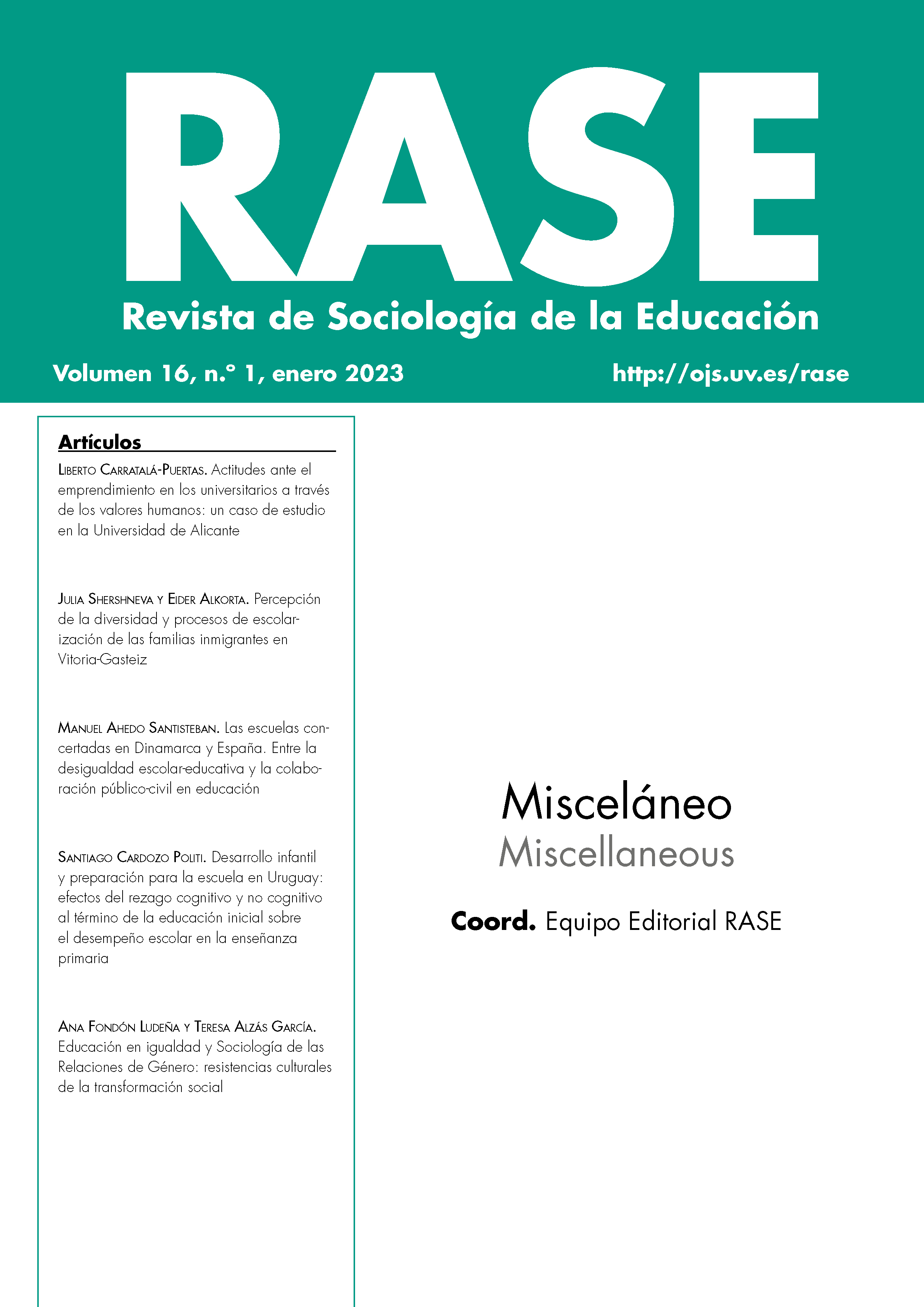Charter Schools in Denmark and Spain. Between School-Educational Inequality and Public-Civil Collaboration in Education
DOI:
https://doi.org/10.7203/RASE.16.1.24360Keywords:
Educational inequality, comparative education, school segregation, school regimes, school policies, public policies. Abstract
Abstract
The concerted or charter schools, created by private and civil actors, follow the official curriculum, are entitled to receive public funding, and can be chosen by families in their right school choice, are on the rise both in Europe and worldwide. In many countries it has been observed they have negative effects to reproduce and to generate school-education inequalities. Within the European context, Spain and Denmark have a prominent level and tradition of concerted schools, albeit with different histories, logics, and practices, and with different effects in relation to school-education inequality. The comparison is institutionalist, organizational, and multilevel: a) national; b) regional-local: Madrid and Copenhagen; and c) school: three concerted Jesuit schools (two in Madrid and one in Copenhagen). In Denmark, the heterogeneous sector of concerted schools has operated within a broad consensus on concertation and curriculum, and it has generated dynamics of both inequality and public-civil collaboration. In Spain, the concerted schools, mostly catholic, have operated within favourable formal regulations, but without a clear consensus, contributing mainly to school segregation, while also including possibilities of public-civil collaboration. From this multilevel comparison some policy recommendations can be made, such as the concept of concerted school with a social function as a basis for the public funding agreements, a curriculum consensus, more locally adjusted schooling policies, and an effective and democratic school autonomy. These policies can lead to a better public-civil collaboration to benefit the whole education system, towards lower educational inequality and better education-society relation.
 Downloads
Downloads
 References
References
Ahedo, Manuel (2010) “Enlightened localism and local experimentalism in public policy: Schooling policies of children with immigrant background in Denmark and Spain”, Comparative Sociology 9, 686-710. doi: 10.1163/156913210X12548913482519.
Alegre, Miguel Angel y Ferrer-Esteban, Gerard (2010) “School regimes and education equity. Some insights based, on, PISA 2006,” British Educational Research Journal, 36 (3), 433–62.
Barnes, Barry (1995) The Elements of Social Theory, Londres, UCL.
Benito, Ricard, Alegre, Miguel Angel y González-Balletbò, Isaac (2014), “School segregation and its effects on educational quality and efficiency in 16 OECD comprehensive school systems,” Comparative Education Review, 58 (1), 104‐134.
Bonal, Xavier, Rambla, Xavier, Calderón, Eduardo y Pros, Núria (2005). La descentralización educativa en España: Una mirada comparativa a los sistemas escolares de las comunidades autónomas. Barcelona: Fundació Carles Pi i Sunyer.
Bonal, Xavier (ed.) (2012), Municipis contra la segregació escolar. Sis experiències de política educativa local, Barcelona: Fundació Jaume Bofill. Col∙lecció Polítiques, 78.
Bonal, Xavier y Bellei, Cristián (2018) “The renaissance of school segregation in a context of globalization.” En Bonal y Bellei (eds.) Understanding school segregation. Patterns, causes and, consequences of spatial inequalities in education. Londres: Bloomsbury
Bonal, Xabier, Zancajo, Adrián y Scandurra, Rosario (2019). “Residential segregation and school segregation of foreign students in Barcelona.” Urban Studies, 56 (15), 3251-3273, doi:10.1177/0042098019863662
Boterman, Willem, Musterd, Sako, Pacchi, Carolina y Ranci, Costanzo (2119). “School segregation in contemporar cities: Socio-spatial dynamics, institutional context and urban outcomes,” Urban Studies, 56 (15), 3055-3073, doi:10.1177/0042098019868377
Fernández Enguita, Mariano (2008). “Escuela pública y privada en España: la segregación rampante”. RASE: Revista de la Asociación de Sociología de la Educación, 1(2), 42-69.
Fernández Enguita, Mariano (2021a). “Si caza ratones, es un buen gato”, Papeles de relaciones ecosociales y cambio global, 153, 21-30
Fernández Enguita, Mariano (2021b). “¿Religión? Sí en la escuela, no en la enseñanza”, Cuadernos de Pedagogía 518, marzo de 2021.
Ferrer, Alvaro y Gortazar, Lucas (2021). “Diversidad y libertad: Reducir la segregación escolar respetando la capacidad de elección de centro.” EsadeEcPol Insight 29.
Gortazar, Lucas (2020). “Segregación y ciudades. ¿Matrimonio inseparable?” Panorama Social 32, 127-141.
Maussen, Marcel y Veit Bader (2015). “Non-governmental religious schools in Europe: institutional opportunities, associational freedoms, and contemporary challenges.” Comparative Education 51(1), 1-21, doi: 10.1080/03050068.2014.935581
Murillo, Francisco Javier, Belavi, Guillermina y Pinilla-Rodríguez, Lina Marcela (2018). “Segregación escolar público-privada a España.” Papers: Revista de Sociologia, 103(3), 307-337, doi:10.5565/rev/papers.2392
Nielsen, Rikke Skovgaard y Andersen, Hans Thor (2019). “Ethnic school segregation in Copenhagen: A step in the right direction?.” Urban Studies 56 (15), 3234-3250. doi:10.1177/0042098019847625
NSG (2021) Indgang fra Sankt Kjelds Gade (1950-2020) [La escuela de la Calle Sankt Kjelds (1950-2020)]. Copenhague.
Olsen, Tore Vincents (2015) “The Danish free school tradition under pressure.” Comparative Education, 51(1), 22-37, doi: 10.1080/03050068.2014.935584
Pérez-Díaz, Víctor, Rodríguez, Juan Carlos y Sánchez Ferrer, Leonardo (2001) “La familia española ante la educación de sus hijos.” Colección Estudios Sociales 5.
Prieto, Miriam, y Villamor, Patricia (2012). “Libetad de elección, competencia y calidad: Las políticas educativas de la comunidad de Madrid.” Profesorado, Revista de Curriculum y Formación del Profesorado, 16 (3), 127-144.
Rogero-García, Jesús y Andrés-Candelas, Mario (2014). “Family and State Spending on Education in Spain: Differences between Public and Publicly-Funded Private Educational Institutions.” Revista Española de Investigaciones Sociológicas, 147, 121-132, doi:10.5477/cis/reis.147.121.
Rangvid, Beatrice Schindler (2010) “School choice, universal vouchers and native flight from local schools.” European Sociological Review, 26 (3), 319-335.
Villamor, Patricia y Prieto, Miriam (2016). “Reformas hacia la privatización de la educación en la Comunidad de Madrid.” Revista de Sociología de la Educación-RASE 9 (2), 265-276.
Downloads
Published
How to Cite
-
Abstract729
-
PDF (Español)341
Issue
Section
License
![]()
This work is licensed under a Creative Commons Reconocimiento-NoComercial-CompartirIgual 4.0 Internacional.




